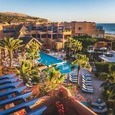
Between the Rhône and the Mediterranean lies a part of southern France that resists tidy definition. The Camargue is not the Provence of postcards—no lavender fields or hilltop villages promising charm by the teaspoon. Instead, it moves to its own rhythm, shaped by water, weather, and long-held traditions. Here, the landscape feels elemental and lived-in, a quiet meeting of salt, sky, and untamed land.

Just outside Les Saintes-Maries-de-la-Mer, at the margin where marsh meets sea, stands L’Estelle en Camargue. It’s a low-key hotel that mirrors the region’s understated character. The buildings settle among the reeds, the infinity pool faces open wetlands, and the rooms open onto terraces where wild horses sometimes appear on the horizon.

The Camargue’s terrain is open, flat, and often surprising in its minimalism. Vast wetlands stretch under broad skies, reeds bend with the wind, and salt flats catch light in sharp, shifting patterns. At times, the land appears emptied out; at others, it pulses with movement—flamingos rising from shallow waters, horses wading through marsh grasses.

At the Parc Ornithologique du Pont de Gau, wooden walkways lead visitors into the heart of this habitat. The birds come and go without fanfare; the constant sounds are those of wings, water, and wind. Nearby, the Camargue Regional Nature Park protects over 100,000 hectares of these wetlands, maintaining the fragile balance of this ecosystem.

The Camargue horses, white, muscular, and rugged, remain integral to the region. They’re not ornamental relics but working animals, herded by gardians—the cattle herders who move black bulls quietly across the flats.
The local bull sport, Course Camarguaise, is a test of skill rather than force; participants aim to remove ribbons from a bull’s horns without harm to the animal, a tradition reflecting respect over spectacle.

Set a little back from the road, near the wetlands, L’Estelle en Camargue embodies the unforced character of the region. Its low-rise buildings, whitewashed and softened by weather, sit amid reed beds and open fields. Paths wind between the rooms, gardens, a pond, and an infinity pool that seems to dissolve into the landscape beyond. The pool area is calm and considered: no piped music, no showy service—just clean lines, well-spaced loungers, and quiet moments. Staff attend when needed and step away when not, matching the measured pace of the surroundings.

With only twenty rooms, all on the ground floor, each opens to a private terrace. Interiors are simple and functional—terracotta floors, pale linens, timber beams, large glass doors framing the wetlands. Some suites offer outdoor baths or showers, discreetly screened by reeds, blending comfort with the natural setting. Nothing is overdesigned here. The spaces feel considered, pared back to essentials shaped by context rather than trend.

The hotel’s restaurant keeps its menu local and seasonal, overseen by one of the owners. Fish is sourced from nearby ports, vegetables and herbs from the region. Camargue red rice appears regularly, paired with grilled sea bass, bull steak, or light, crisped courgette flowers.

Dishes are straightforward and well executed, never overstated. The wine list focuses on the Languedoc and southern Rhône but includes a few selections off the beaten path. Breakfast, often taken on the terrace, is similarly simple and unpretentious—warm bread, local eggs, fresh coffee. Inside, the bar and lounge maintain a low profile. In cooler months, the Sunset Lounge hosts quiet live music and a fire in the hearth, inviting guests to linger without urgency.

From spring through early autumn, the Camargue reveals its true character: migratory birds return, the light sharpens, and colours deepen. This is a place for those who appreciate open space and landscapes left largely untouched. It asks little of its visitors but offers rich rewards to those willing to observe without expectation. Here, history remains woven into the land’s fabric, which resists being tamed or softened. Staying at L’Estelle en Camargue allows you to experience this quietly—a chance to watch herons take flight, reeds sway in the wind, and the fading light stretch across salt flats. The comfort here is measured, found in stillness and space rather than spectacle.

